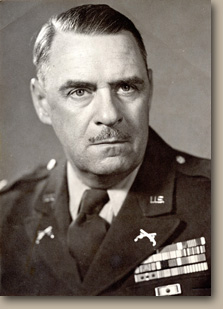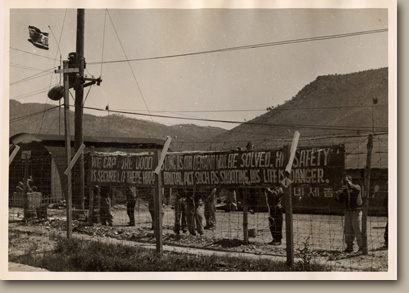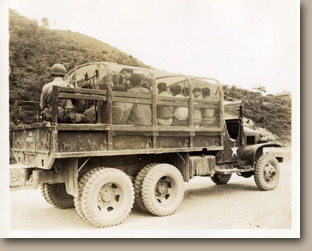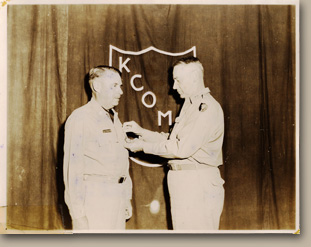LT. COL. WALTER ERI MULLIN REDDEN
 The Albany, N.Y., Times-Union dated Friday, June 6, 1952 reads: "A Red - Letter Day for the Reddens." The article reveals that at 1AM on May 28, 1952, at the Fort McClellan Hospital, near Anniston, Al, Mrs. Redden gave birth to a baby girl. The following morning, Brigadier General Haydon L. Boatner appointed Lt. Colonel Walter Redden as commander of the notorious Compound 76 on Koje Island in South Korea. Lt. Col Redden had been assigned to the United Nations Committee on Repatriation of Prisoners of War in Korea in April 1952. He left his family in the United States on April 27, 1952 for his Korean assignment. He and his youngest daughter did not meet each other until the Fall of 1953.
The Albany, N.Y., Times-Union dated Friday, June 6, 1952 reads: "A Red - Letter Day for the Reddens." The article reveals that at 1AM on May 28, 1952, at the Fort McClellan Hospital, near Anniston, Al, Mrs. Redden gave birth to a baby girl. The following morning, Brigadier General Haydon L. Boatner appointed Lt. Colonel Walter Redden as commander of the notorious Compound 76 on Koje Island in South Korea. Lt. Col Redden had been assigned to the United Nations Committee on Repatriation of Prisoners of War in Korea in April 1952. He left his family in the United States on April 27, 1952 for his Korean assignment. He and his youngest daughter did not meet each other until the Fall of 1953.
The troubled Compound 76 was the scene on May 7, 1952 of the capture of former Brig. Gen. Francis T. Dodd by Communist prisoners of war. A new commander, Brig. Gen. Charles F. Colson, came in and threatened the captors and negotiated for Dodd’s life. After 78 hours, Dodd was released unharmed in exchange for a document signed by Colson. The document admitted nearly every charge in the Communist propaganda manual, and made promises that were not within his ability to grant. As a result of his serious lapse of judgment, he was demoted to Colonel. Dodd was also demoted to Colonel and their superior, Brig. Gen. Paul Yount was reprimanded. Lt. Col. Wilbur Raven who was Lt. Col. Redden’s predecessor was relieved of his position. Any student of the Koje-do prisoner of war history knows the disgrace brought to the United States Army that was followed by the corrections that resulted in a controlled, functioning POW facility.
In taking command of Compound 76, Lt. Colonel Redden had responsibility for more than 5,000 North Korean and Communist Chinese prisoners. His selection by Boatner was due to Colonel Redden’s accomplished military history, experience and his knowledge of the Korean language acquired during a two year tour of duty in South Korea after World War II.
 On Saturday May 31, 1952 Lt. Col. Redden wrote to his wife. This letter begins with his description of how he was given a copy of the military newspaper, the Stars and Stripes, which notified him regarding the birth in Alabama of his child. The cable his mother-in-law sent on May 28th did not find the Colonel. The letter then states: "Right after reading it, I had to go out to 76 to handle a small situation. A work detail returning to the compound refused to be shackled prior to going inside. It took me over an hour to accomplish it however, they were searched without using any force. I had to call the No. 1 Communist leader to the gate to do it. I convinced him to direct the prisoners to willingly submit. I followed my firm, calm and determined manner coupled with courteous wording. It seems to be working and my subordinate officers are astounded and greatly confused. I pray very often for guidance and courage and patience to continue. I think my method in my valley is making further progress in gaining control than the type of slightly arrogant measures used in the other valley and by the General. I believe that this afternoon’s peaceful victory coming 24 hours after one of my men killed 4 prisoners of war, is a tremendous thing and a great step in absolute control of all the P.O.W.’s. I feel confident that with God’s help and being left alone by higher headquarters, I can do what many people have said was impossible. That is, the gaining of control of the compounds without resorting to force & bloodshed and with appeasement to the P.O.W’s. I am always courteous but I insist that they obey me at the same time I do not ask them to do anything which is beneath the dignity of a man. I do not cause them to lose face but at the same time, they must do as I ask. I do not bluster, rave or yell at them. I merely, very quietly put them in such a position that if they were to refuse me they would lose face in the eyes of the other prisoners. I trust that God will keep giving me the wisdom to select the proper words. I treated the Colonel of the North Korean Army as a soldier but told him that I as a soldier was his captor and guard and that he as a soldier knew that it was necessary for me to direct my officers and men to do certain things and that he as a soldier had the power to assist me by directing his fellow prisoners to comply. He assured me that if I contacted him first in anything new that I wanted done, he would assist me by directing that my orders be respected and obeyed. He then issued an order and the compound was quieted and the prisoners went about their business and my men searched the prisoners and put them back into the compound. I then thanked them for their cooperation and came back to a late supper."
On Saturday May 31, 1952 Lt. Col. Redden wrote to his wife. This letter begins with his description of how he was given a copy of the military newspaper, the Stars and Stripes, which notified him regarding the birth in Alabama of his child. The cable his mother-in-law sent on May 28th did not find the Colonel. The letter then states: "Right after reading it, I had to go out to 76 to handle a small situation. A work detail returning to the compound refused to be shackled prior to going inside. It took me over an hour to accomplish it however, they were searched without using any force. I had to call the No. 1 Communist leader to the gate to do it. I convinced him to direct the prisoners to willingly submit. I followed my firm, calm and determined manner coupled with courteous wording. It seems to be working and my subordinate officers are astounded and greatly confused. I pray very often for guidance and courage and patience to continue. I think my method in my valley is making further progress in gaining control than the type of slightly arrogant measures used in the other valley and by the General. I believe that this afternoon’s peaceful victory coming 24 hours after one of my men killed 4 prisoners of war, is a tremendous thing and a great step in absolute control of all the P.O.W.’s. I feel confident that with God’s help and being left alone by higher headquarters, I can do what many people have said was impossible. That is, the gaining of control of the compounds without resorting to force & bloodshed and with appeasement to the P.O.W’s. I am always courteous but I insist that they obey me at the same time I do not ask them to do anything which is beneath the dignity of a man. I do not cause them to lose face but at the same time, they must do as I ask. I do not bluster, rave or yell at them. I merely, very quietly put them in such a position that if they were to refuse me they would lose face in the eyes of the other prisoners. I trust that God will keep giving me the wisdom to select the proper words. I treated the Colonel of the North Korean Army as a soldier but told him that I as a soldier was his captor and guard and that he as a soldier knew that it was necessary for me to direct my officers and men to do certain things and that he as a soldier had the power to assist me by directing his fellow prisoners to comply. He assured me that if I contacted him first in anything new that I wanted done, he would assist me by directing that my orders be respected and obeyed. He then issued an order and the compound was quieted and the prisoners went about their business and my men searched the prisoners and put them back into the compound. I then thanked them for their cooperation and came back to a late supper."
 In a letter to his wife dated Monday, June 16, 1952 he wrote: "This afternoon we found a prisoner was in one of my many compounds who was wanted for trial for killing other prisoners. He refused to come out - in fact the spokesman said he was not in the compound. I brought about 200 soldiers with tear gas and he saw them and sent word he would come out. I had the gate opened, he shook hands with the spokesman and surrendered himself to me. He was a leader of the infamous 76. I met Field Marshal Alexander today. He went through my valley. I had about 2000 prisoners out of the compounds working at a hundred different jobs. The General (Boatner) was quite pleased with the show. I guess we showed the British that we can control the prisoners."
In a letter to his wife dated Monday, June 16, 1952 he wrote: "This afternoon we found a prisoner was in one of my many compounds who was wanted for trial for killing other prisoners. He refused to come out - in fact the spokesman said he was not in the compound. I brought about 200 soldiers with tear gas and he saw them and sent word he would come out. I had the gate opened, he shook hands with the spokesman and surrendered himself to me. He was a leader of the infamous 76. I met Field Marshal Alexander today. He went through my valley. I had about 2000 prisoners out of the compounds working at a hundred different jobs. The General (Boatner) was quite pleased with the show. I guess we showed the British that we can control the prisoners."
Having successfully completed bringing control and safety to the Prisoners and to the US soldiers at Koje-do, Lt. Col. Walter Redden was assigned as the Prisoner of War Army commander at Taegu. There, he commanded PW Camp No 4A which held anti-communist prisoners. Next he was appointed on August 5, 1953 as the Provost Marshall of the Korean Communications Zone (KComZ) which had its provisional headquarters at Munsanni. He was responsible for the delivery of Chinese and North Korean prisoners into communist control. He had escort guards stationed at TASP (train, ambulance switch point) and at Freedom Bridge Station. This was the Big Switch. Lt. Col. Redden was quoted in a newspaper article with the following: "In an operation such as this-involving PW’s-the eyes of the world and particularly those of the Communists are on the military police. Extreme delicacy has to be used in handling the prisoners." The military police under Redden’s command had the duty of controlling traffic and maintaining order, and escorting Communist prisoners to the reparation point.
 On September 25, 1953, Major General William S. Lawton, Korean Communication Zone Commander, awarded the Legion of Merit to Lt. Col. Walter Redden for "exceptionally meritorious service from May 28, 1952 to May 29, 1953 during which he was responsible for the control and utilization of some 60,000 prisoners of war captured by UN forces. The citation states the Colonel acted in a "highly commendable manner". His "sound professional judgment, outstanding ability and constant devotion to duty earned him the respect and admiration of all with whom he served." The citation concludes by saying his service "materially advanced the cause of the UN in Korea and reflects great credit upon himself and the military service." In a letter to his wife, dated September 17, 1953 he told her, "Yesterday morning, General Lawton pinned the Legion of Merit on me and I felt foolish. I am proud to have it."
On September 25, 1953, Major General William S. Lawton, Korean Communication Zone Commander, awarded the Legion of Merit to Lt. Col. Walter Redden for "exceptionally meritorious service from May 28, 1952 to May 29, 1953 during which he was responsible for the control and utilization of some 60,000 prisoners of war captured by UN forces. The citation states the Colonel acted in a "highly commendable manner". His "sound professional judgment, outstanding ability and constant devotion to duty earned him the respect and admiration of all with whom he served." The citation concludes by saying his service "materially advanced the cause of the UN in Korea and reflects great credit upon himself and the military service." In a letter to his wife, dated September 17, 1953 he told her, "Yesterday morning, General Lawton pinned the Legion of Merit on me and I felt foolish. I am proud to have it."
Walter Redden was born on December 13, 1904 in NY. He grew up in Rensselaer, NY. He was a drummer with his own Big Band and would occasionally, late in life, talk about people he knew, such as Glenn Miller, Morton Downey, Sr., etc. He married Edna Paul when they were both very young. They had five children, Ruth Redden Rushby, Thomas Walter Redden, Elizabeth Redden Zimmerman, Sally Redden, and Paul Redden. Walter Redden was active in his community which remained his way of life wherever he lived. He was involved in the Boy Scouts organization in NY and in Korea in the 1940’s. He was the Vice President of the Junior Chamber of Commerce in NY. He enlisted in the New York National Guard on October 4, 1927 for a period of three years and was discharged as a Corporal on October 3, 1930. He reenlisted as a Corporal on November 25, 1930 and left as a Sergeant in June 1935. He then enlisted in the 10th Infantry, New York National Guard as a Private on January 18, 1938 and separated on November 27, 1938 to accept commission as Second Lieutenant as Communications Officer for 1st Battalion, 10 Infantry Regiment. He attended the Infantry School at Fort Benning, Georgia from February 1940 through May 1940. He was ordered to active duty with the 10th Infantry on October 1940 as a First Lieutenant and was promoted to Captain in April of 1942 when he was serving as Company Commander of Company A, 10th Infantry (which had been designated as Company A, 106th Infantry Regiment). He served in Hawaii from March 1942 until August 1942. He returned to the United States due to the terminal illness of his wife. He was assigned to the Voorheesville Holding and Reconsignment Point, Vooheersville, NY. He remained there serving in various positions until June 1946 at which time the facility became known as the Voorheesville Sub-Depot of the Schenectady General Depot. He was the Commanding Officer of that facility in 1946. He was sent to Fort McClellan, Alabama for a brief stint to train troops where he met a local young woman named Virginia Browning who was active in the USO. They married and she moved to Castleton, NY. He was assigned overseas at the rank of Major to the 3rd Battalion, 31st Infantry, 7th Infantry Division in Korea in August of 1946. Upon his return he was assigned to Fort Dix, New Jersey in November 1948. He initially served as Post Safety Director and later as Post Provost Marshal. He was promoted to Lieutenant Colonel on June 15, 1951. His next posting was his sensitive and highly complex assignment to Koje-do when his daughter Jane Redden Whisenant was born. Upon his return to the States from South Korea after completion of the Big Switch, he was assigned as Provost Marshal of Fort Jackson, South Carolina in November, 1953. His military record states he was relieved from active duty as an officer in December 1957 "because of age".
Among the decorations Lt. Col. Walter Redden was authorized to wear included: Occupation Medal, American Campaign Medal, American Defense Service Medal, World War II Victory Medal, Army Commendation Ribbon, Korean Service Medal, United Nations Service Medal, Asiatic-Pacific Theater of Operations Ribbon, Korean Presidential Unit Citation, Armed Forces Reserve Medal, National Defense Service Medal and the Legion of Merit.
Lt. Col Walter Eri Mullin Redden retired to live in Huntsville, Alabama where he became a Civil Service employee. He was the Safety Director for Redstone Arsenal He continued to be involved in his community, he was a sought after public speaker and played percussion in the Huntsville Symphony Orchestra and the City Band.
He died in Memphis, TN after a 12 hour open heart surgery on September 20, 1973.